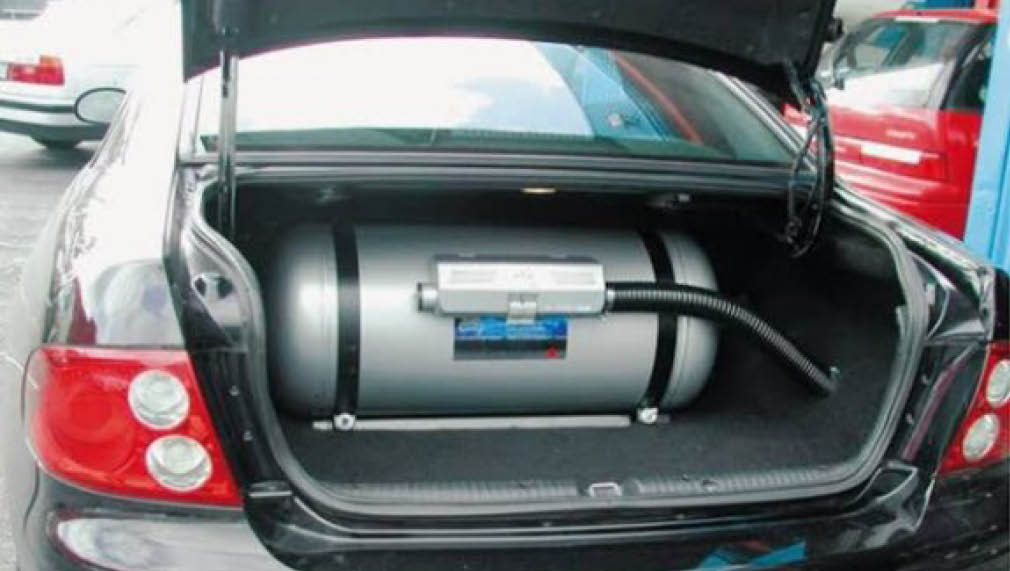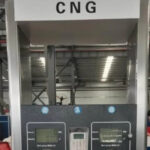Commercial vehicle drivers and other potential users are raising concerns over inadequate infrastructure for conversion and refuelling, as well as high cost of kits for seamless transition to the Compressed Natural Gas (CNG)-power system for their vehicles, Daily Trust’s findings have shown.
This is coming at the height of the renewed vigour of the federal government through the Presidential Initiative on Compressed Natural Gas (Pi-CNG) to drive the transition from petrol-powered vehicles to CNG to mitigate the high cost of petrol.
Our correspondents report that the latest intervention by the government on the CNG took place on Friday, October 18, 2024, in Uyo, Akwa Ibom State.
It was tagged, “Conversion Incentive Programme.”
- 2027: Nigeria must avoid becoming a one-party state – Makinde
- Mixed feelings over directive to foreign airlines to patronise local caterers
Unveiling the programme in a brief ceremony at Nsik Motors Terminal, Itam, Uyo, the Programme Director and Chief Executive of the Presidential Compressed Natural Gas Initiative, Michael Oluwagbemi, stated that the initiative was aimed at mitigating the financial burden caused by the fuel subsidy removal.
Oluwagbemi, who was represented at the event by the Head of Commercials, Tosin Coker, added that the inauguration was a pilot project designed to bring about a new benchmark for CNG vehicle conversion and training in the state. The federal government had unveiled the CNG initiative with focus on converting one million petrol-powered vehicles to gas by 2027.
Government officials say the PiCNG has been working relentlessly to roll out CNG vehicles across the country by declaring free conversion which kicked off recently in Lagos, Ogun, Oyo, Abuja, Kaduna, among others.
The government had earlier approved the rollout of CNG for vehicles at N230 per kg to provide a cheaper and cleaner alternative to petrol, after the price of the latter was jacked up.
At present, a litre of petrol is sold above N1, 000 at official price with independent marketers selling as much as N1, 200.
But apart from the few conversion centres set up by the PiCGN, many states across the country do not yet have conversion centres, let alone operationalising the CNG initiative.
With conversion costing between N1.2 million and N1.5 million, many commercial motorists said they could not afford it.
There are some CNG dispensing stations across the country for those who wish to fill their vehicle cylinders. This is just as reports from across the states indicate a slow take-off of the initiative.
No conversion centre in Kano yet
Commercial drivers in Kano said they were disturbed over the absence of CNG conversion centres in the state, as rising cost of fuel continues to take toll on their profit margins.
Daily Trust reports that no CNG conversion centre is made available in Kano, despite its high population and sheer number of commercial vehicles trooping in and out of the state on a daily basis.
Checks by one of our correspondents revealed that the NNPC Mega Station, located at Hotoro Eastern bypass roundabout, had been earmarked for this purpose, but it has not taken off.
A transport union branch chairman at Gyadi-Gyadi Zaria Road Mini Motor Park, Adamu Yakubu Mai Karfi, said members could not fathom why a conversation centre was not yet sited in Kano which can potentially offer alternative to expensive fuel.
A commercial driver, Suleiman Isa, said he was eager to convert his vehicle.
Similar concerns in Borno, Yobe
The Chairman of the Nigerian Association of Road Transport Owners (NARTO) in Yobe State, Mohammed Isa Nyakire, said like what obtains in other countries, Nigeria must also consider articulated vehicles in the CNG initiative.
“Since the CNG conversion initiative is meant to reduce the cost and hardship of motorists, we expect that the North East should be among the first to have a centre.
“Few days back, we had a stakeholders meeting with the North East Development Commission on their plan to introduce e-vehicles to ease transportation cost. It’s a welcome idea but unfortunately, heavy trucks were also not part of their target.
“However, they all promised to expand the initiatives to cover trucks, but I would also advise that it should be urgent…Businesses have been grounded with the current state of affairs,” he said.
Inusa Salihu, a motorist at Bulumkutu area, Maiduguri, said he was afraid of converting his car to CNG.
“You know, we all need a substitute for petrol but how are we sure that the price of CNG will not go high? We want the government to do a lot of sensitisation,” he said.
Kogi
The federal government had on October 2, 2024, inaugurated its P-CNG project in Lokoja, Kogi State, with 10 CNG-powered buses.
Our correspondent reports that apart from Lokoja where the project was launched, there are no CNG dispensing centres in other parts of the state.
But an official, who pleaded for anonymity, said several areas in Lokoja, Kabba, Okene and Idah in the state have been marked out for dispensing centres.
“The main concern now is how long it will take for them to establish the centres,” he said.
A resident, Usman Abdu, said while he is willing to convert his vehicle, which he believes is necessary, “my fear is about the refuelling stations.”
Oyo
Daily Trust reports that three conversion centres are operational in Ibadan, one at NIPCO Filling Station near Toll Gate, Ibadan-Lagos Expressway, while the second is at Automation Auto Gas, Podo Industrial Village and BOVAS Filling Station, Ajibode, along the UI Ojoo Road, Ibadan.
However, a number of commercial drivers who spoke with Daily Trust alleged high cost of conversion to CNG.
A private car owner, Wole Jayeola, who converted his Toyota Corolla 2010 model two months ago, said using the CNG is the best way for Nigerians to overcome the challenges of the high cost of fuel.
He urged the federal government to subsidise the cost of conversion of vehicles to encourage others.
Akwa Ibom
In Akwa Ibom State, there is no CNG conversion centre.
However, the state-owned company, Nsik Oil and Gas Limited, was among the six gas infrastructure companies that signed N122 billion project equity through the Midstream and Downstream Gas Infrastructure Fund, with the federal government last week.
Governor Umo Eno had said a CNG-bus project would soon be launched, but noted that without having refilling depots, it is senseless to introduce CNG-powered buses.
“We’re in search of partners who will provide refilling depots for our CNG buses. Once this is achieved, we’ll launch this programme. It does not make sense to buy CNG buses that’ll not have refilling depots. Doing so will defeat the purpose of this initiative,” he said.
Ekiti
The PCNGi recently launched about 15 buses and seven conversion centres to kick off the initiative in Ekiti State.
The CEO of PCNGi, Oluwagbemi, had said many more conversion centres would be established to empower the state.
A driver, Oyekanle Jeleel, said he decided to convert his car to CNG because of the positive testimonies from those who are already using it.
The Chief Operating Officer of Portland Gasoline Technology, Michelle Ejiofor, said: “If we have a lot of the mass transit vehicles being retrofitted with the CNG, it means that it will lower the cost of food, cost of transportation. And then Nigerians get to smile, actually.”
Kaduna
There are three accredited CNG conversion centers in Kaduna State located at the National Institute for Transport Technology (NITT) Zaria, the Peugeot Automobile Nigeria Limited (PAN) in Kakuri, and Royal Energies in Kakau along the Kaduna-Abuja highway. But there is only one CNG dispensing point available in Kaduna which is Greenville LNG located also along the Kaduna-Abuja road.
Chairman, NURTW, Kofar Doka branch, Zaria, Lawal Abdullahi, told Daily Trust that eight vehicles had so far been converted in his branch.
He said, “I am just coming back from Kaduna where I went to refill my car. It is a good initiative, but the distance to refill my 4.6kg cylinder at N6,700 cost me fuel of about N20,000.
“Another issue we have encountered is leakages from the cylinders and lack of calibration computers. Some cars were leaking. Even though they have been fixed, we are not using the gas because the cars have not been calibrated.”
Benue
In Benue State, there are no conversion centres and CNG filling stations yet, but the Commissioner for Power, Transport and Renewable Energy, Matthew Omale, told our correspondents yesterday that efforts were underway to address the issue.
He said though the NURTW had been engaged in discussions to drive this initiative, the lack of infrastructure posed a challenge.
Plateau
Our correspondent reports that there is no CNG conversion centre yet in Plateau State.
Officials of the PiCNG had, earlier this year visited Jos to search for a site for a conversion centre, but have yet to return.
Chairman, NURTW, Bauchi Motor Park, Jos, said: “Our concern with the CNG is that,in the long run, it may become expensive like petrol.”
Kwara
Government officials in Kwara State yesterday told Daily Trust that the federal government’s kits for the CNG project had not been received. An official of the state’s Ministry of Works, who preferred anonymity, said: “The kits from the federal government are yet to get here.”
When Daily Trust visited the Roller Energy Station located at the Post Office, an official said “everything had been installed. “Our problem is lack of gas.”
What FG should do to drive the initiative – Stakeholders
The Chairman of the National Association of Small and Medium Enterprises (NASME) in Lagos State, Prof. Adebayo Adams, said with the “suffocating” petrol prices, the federal government should heavily subsidise CNG conversion.
“Also, let us have CNG sold at all filling stations as cheap as N100 per kg. When we do this, people will naturally abandon petrol since they are suffocating us,” he said.
An automotive expert, Keinde Samuel, also told Daily Trust that petrol filling stations should be made to install gas filling facilities.
A Lagos-based auto dealer, Femi Olawale, said the first thing the government should have done was to have embarked on a train-the-trainer programme for mechanics and auto technicians across the 36 states of the federation and the FCT.
$20bn required annually to fund gas infrastructure – Expert
The Managing Director/Chief Executive Officer of Eterna Plc, Abiola Lawal, said Nigeria’s energy sufficiency could be achieved through CNG and LPG if critical stakeholders collaboratively invest in the gas sector.
“Large scale investment in gas infrastructure – $20 billion is required annually. The Presidential CNG Initiative plans to raise over $350 million for CNG infrastructure by 2027,” Lawal said, at the 2024 NAEC annual strategic international conference.

 Join Daily Trust WhatsApp Community For Quick Access To News and Happenings Around You.
Join Daily Trust WhatsApp Community For Quick Access To News and Happenings Around You.


